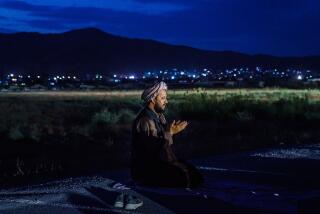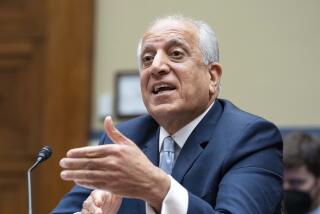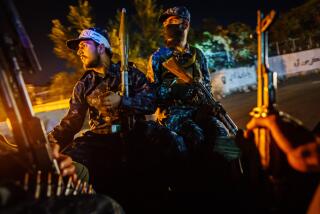Afghan Minister Who Denounced Corruption Quits
- Share via
KABUL, Afghanistan — Interior Minister Ali Jalali, one of the most respected members of President Hamid Karzai’s Cabinet, resigned Tuesday after complaining for months that some senior officials were involved in drugs and corruption.
Jalali announced his resignation in an interview with a private Afghan television station, but was evasive about his reasons for stepping down.
“I will not work as interior minister anymore,” Jalali told Tolo TV. “Whatever the reasons -- but one of the main reasons is that I wish to resume my academic research. I was involved in academia in the past, and I feel really comfortable in that field.”
At a news conference today, Jalali did little to elaborate, saying only that he was tired, as anyone would be after three years as interior minister. Khaleeq Ahmad, a presidential spokesman, insisted there was no friction between Jalali and Karzai.
“This is something he’s been wanting to do for a long time,” Ahmad said. “He has announced it on TV, and he’s now sure that he wants to leave and pursue an academic career in Washington.”
Jalali headed the effort to build a national police force, which is essential to expanding security to the large areas of the country that are still unstable.
He also vowed to go after corrupt officials and drug barons. But officers in the counternarcotics police echoed Jalali’s complaints that senior officials in the capital and in the provinces profit from the heroin trade.
Jalali is one of a few skilled technocrats in a government that includes former warlords, and his departure is a blow to Karzai as the president tries to build trustworthy institutions and end a stubborn Taliban-led insurgency.
Two U.S. troops were killed in attacks in Afghanistan, the military said Tuesday. A soldier died under enemy fire during an assault west of the southern city of Kandahar on Monday, and a Marine was killed the same day when insurgents fired mortar bombs, rocket-propelled grenades and assault rifles at a base near Asadabad, the capital of Kunar province in the east.
At least 53 Americans have died in combat in Afghanistan this year, the deadliest for U.S. troops since the Taliban regime was toppled in late 2001. About 1,200 Afghans, many of them members of the security forces and suspected guerrillas, have died in the insurgency this year.
Jalali is an Afghan American and former head of the Voice of America’s Pashto- and Persian-language services. He graduated in 1964 from the U.S. Army Infantry Officer Advanced Course at Ft. Benning in Georgia and, while based in neighboring Pakistan, advised Afghan rebels during the 1980s war against Soviet troops occupying Afghanistan.
He returned to Afghanistan from the U.S. to become Karzai’s interior minister in early 2003.
In February, Jalali said the Afghan government had a list of senior government officials involved in the multibillion-dollar heroin and opium trade. But he said the country’s police force lacked the resources to gather evidence and prosecute them.
Jalali tried to resign the same month, but Karzai told him to stay in his post until after the Sept. 18 elections for parliament, according to an Interior Ministry source who said he had spoken Tuesday to senior officials close to Jalali.
In conversations with his staff Tuesday, Jalali cited several reasons for resigning, said the source, who spoke on condition of anonymity because he is not authorized to speak to reporters.
The reasons included conflicts with officials in the presidential palace and Jalali’s belief that the new parliament, which must approve the Cabinet, would not accept him because he has dual citizenship, the source said.
Jalali also has complained about Karzai’s appointment of former warlords and other corrupt officials to key posts in provincial administrations.
Ahmad said Jalali’s deputy in charge of the counter-narcotics police, Gen. Mohammed Daoud, would carry on the fight against drug traffickers. But in interviews earlier this year, several of Daoud’s police officers said they suspected he was involved in the heroin trade. Daoud denies the allegations.
*
Times special correspondent Wesal Zaman contributed to this report.
More to Read
Sign up for Essential California
The most important California stories and recommendations in your inbox every morning.
You may occasionally receive promotional content from the Los Angeles Times.













